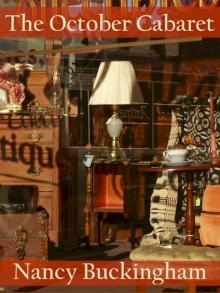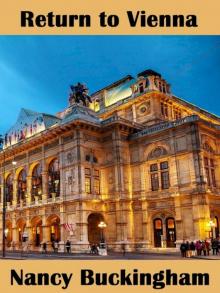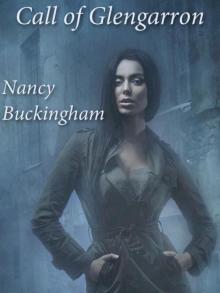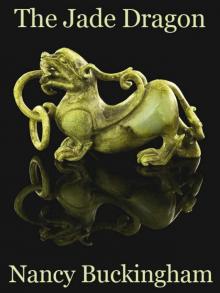- Home
- Nancy Buckingham
The October Cabaret
The October Cabaret Read online
THE OCTOBER CABARET
Nancy Buckingham
Chapter One
The Queen was holding a garden party at Buckingham Palace today, according to a know-it-all on the coach from the airport, which wasn’t helping London’s traffic snarl-ups any. After a bumpy night flight from Montreal, with a rail journey still ahead of me, I was feeling decidedly wilted on this hot and sticky July afternoon.
But two hours later, when the train pulled into a long, curving platform at Brighton Station, my spirits had bounced right back again. In the taxi I glanced around me eagerly, excitement mounting.
There were changes, but less than I had expected. As we swung with the traffic across into Grand Parade I craned my neck to admire the graceful Regency buildings, tall and white-painted, their bowfronts prettily embellished with wrought-iron balconies, Straight ahead, through the dense-leafed trees of Victoria Gardens, I caught teasing glimpses of oriental domes and pinnacles; the Royal Pavilion, thrown up at ruinous expense two centuries ago by the dashing young Prince of Wales, Prince Regent as he became - and for a few soberer years King George IV - as his seaside palace of pleasure. I caught, too, the evocative tang of ozone in the air— which more than anything else, maybe, tugged my thoughts back to that other summer.
“What memories it all calls to mind,” I sighed to the driver self-indulgently.
He flickered me a life-wearied smile. “Get away with you, love, a young girl like you. How long since you were in Brighton, then?”
“It must be ... oh, all of six years.” It was exactly six years, to the very month.
“That’s hardly the day before yesterday,” he scoffed, and trod on the gas to beat a car to a kerb space. “Here we are. Want me to carry your suitcases in for you? They look a bit on the heavy side to me.”
“Thanks a lot.”
I was more than ever grateful for the extra service when I discovered there was no elevator (correction, lift) to the lawyer’s office two floors up. The curving staircase had an elegant scrolled banister and clackety brass treads. On the landing I paid off the taxi driver, and his gratified grin showed that I’d not misjudged the right tip. I was standing outside a door with a frosted-glass panel and obeyed the sign PLEASE ENTER, hauling my luggage in with me.
I was expected, praise be. The plump girl behind the typewriter nodded knowingly when I gave my name, passed the information via an intercom, and announced that Mr. Kemp would not keep me waiting.
The man who forthwith came out to greet me was a lot younger than I’d imagined, my own side of thirty. I liked his tawny-brown eyes because they were friendly and warm, growing flatteringly warmer as he looked me over. He shrugged his hefty shoulders more comfortably into the jacket he’d hastily donned, and held out his hand.
“Miss Pennicott, how are you? I’m Peter Kemp.”
“Glad to know you, Mr. Kemp.”
“Come on in.” He stood aside for me to pass, and glanced at the girl behind the desk. “Could you rustle up some tea, please, Beryl?”
His office was a room of graceful proportions, with two tall windows and walls panelled in pale apple-green; the plasterwork of the ceiling a moulding of intertwined acanthus leaves, the floor spread with a rather beautiful, if ageing, carpet. But it was businesslike, too, with stacks of legal books ranged round on white shelving, and lots of bulging files. He put me in a chair that might or might not have been Chippendale, then sat down himself at the mahogany desk, leaning back and stretching his long legs while he surveyed me some more.
“I guess I must look in desperate need of that cup of tea,” I said, with an embarrassed laugh.
“On the contrary, you look...” He smiled, his eyes crinkling at the corners. “You look delightfully cool and collected.”
“Well, I don’t feel it. To be candid, Mr. Kemp, I feel rather jittery because I’m not certain what the drill is about me inheriting Uncle Maynard’s property.”
“No problems. We’ll get it all sorted out quite easily. I suppose your uncle’s death came as quite a shock to you, considering he was only fifty-eight? Still, with something like diabetes, you can’t tell.”
“But his condition was never any real problem to him, you know. Uncle Maynard used to say that you could quit worrying about being a diabetic once you grasped the essentials of your metabolism and remembered to balance your carbohydrate intake and the amount of exercise you took. He was always so careful about that.”
“Not this time, it seems.” Peter Kemp’s sandy eyebrows knitted in a frown. “As I explained in my letter, his body was found in a lonely spot right up on the Downs. I gather he was accustomed to taking long, solitary walks, but he must have overdone it that day and he collapsed in a coma. If only someone had happened along, they might have saved his life. Anything sweet would have done ... just a square of chocolate or something.”
“But Uncle Maynard always used to carry sugar on him - most diabetics do.”
“Apparently he slipped up for once.”
I shook my head sadly. “It seems terrible for a man to die alone like that. I hope he didn’t suffer.”
In the momentary silence I glanced out of one of the long windows at the trees of Old Steine gardens, remembering my uncle as I had last seen him six years ago. A big-framed man, like my father; and like my father, too, his hair had turned to silver rather early on in life. His eyes, set wide apart in a ruddily healthy face, were a clear deep blue, and twinkled perpetually.
“I didn’t really know Mr. Pennicott,” the lawyer explained. “In fact, I only met him on one occasion, a couple of years back. He had a small query about his rent being increased ... as it involved both his antique shop and the living accommodation above, he wanted to know how it would affect his tax position and so on. All quite straightforward. The lease had originally been negotiated by the solicitor I bought this practice from, so that’s why your uncle came to me.” He pursed his lips. “I can just about match a face to his name, but that’s all, and there wasn’t much information to help me on his file here. From the enquiries I’ve made, though, it would appear that you’re his only near relative, Miss Pennicott.”
“Well, yes, I must be. Uncle Maynard never married, you see, and my father was his only brother.” Somewhat defensively, I added, “I’m afraid we didn’t see very much of him. He and Dad always kept in touch, of course, but Dad’s job kept him abroad most of the time... originally in the Far East, and then, after he had his first coronary, the firm transferred him to their Canadian office. In between we spent a summer in Brighton for Dad to recuperate. Uncle Maynard was the only family either of my parents had in England, so they rented a house here to be near him. That was the last time—the only time, really, apart from when I was quite tiny—that I saw Uncle Maynard. So my knowledge of him is pretty limited, too.”
“And now you’re his heir.” Hurriedly, Peter Kemp went on, “Not that there’s a lot coming to you, Miss Pennicott. I hope my letters didn’t raise your expectations too much. His money was tied up in his business.”
I said with dignity, “I didn’t come to England with the idea of collecting a fortune, Mr. Kemp.”
“It wasn’t necessary for you to come at all, you know. I could have handled everything for you. That is,” he amended, “assuming you want me to continue acting on your behalf. I was brought into this by the police, when your uncle was found dead. It was Monsieur Duvillard who gave them my name.”
“Monsieur Duvillard?”
“He was a close friend of Mr. Pennicott’s. He owns a restaurant in the Lanes. L’Oiseau Bistro.”
“Oh yes, I remember. Uncle Maynard took us all there a couple of times.”
Plump Beryl came in with two cups of tea on a tray, a petit beurre biscui
t balanced in each saucer.
“So, am I to be your legal representative?” Peter Kemp resumed, when she’d departed.
“Please.”
“Right. Now, then, as to where you’ll be staying, I’ve booked you a room at a small private hotel in Upper Rock Gardens. There isn’t much choice at this time of year, with the town so full of holidaymakers, but I think you’ll find it clean and comfortable.”
Taken by surprise, I faltered, “But I was planning to stay at the apartment above the shop. I mean, there’s no reason why not, is there? That way I shall be right on the spot.”
His brow ridged. “I didn’t think you’d want to bother with the business of looking after yourself for the short time you’ll be here.”
I sipped my tea and nibbled at my biscuit. Until this moment my plan had seemed so sane and sensible. Now, before this lawyer’s critical gaze, I suddenly felt qualms.
“You’ve got it wrong, Mr. Kemp,” I said. “I intend to stay here permanently. Well... for the time being, anyhow, to see how things work out. I want to take over the shop and run it myself.”
He didn’t try to conceal his surprise.
“Do you know anything at all about the antiques trade?”
“Not a lot, I admit, but I’ll soon learn.”
“It’s no game for an innocent,” he warned.
“Don’t worry, I can take care of myself.”
“I wonder.” Peter Kemp reached for one of the manila folders on his desk, flicked it open and read through a letter. I got the feeling he was putting on a heavy professional act. “I’d better tell you straight away that I’ve already received an offer for your uncle’s business. A good one, too. You’d be well advised to accept it.”
“Someone’s in a hurry,” I said, choking back my astonishment. “Who’s it from?”
His look reproved me. “I’m afraid we’re not yet at the stage of naming names.”
“It’s a good offer, you say?”
He nodded, and riffled through more papers in the file. “These are the terms ... you’d get an amount equal to the full retail valuation of the stock, plus the same again for goodwill. Generous, I’d say ... more than generous.”
Shaken, feeling irrationally as if my lovely prize was being filched from under my nose, I remarked with some asperity, “My stepfather—who’s in real estate—told me once that in business there’s no such thing as a generous offer. Only ulterior motives.”
“But if something happens to be worth more to one person than to another . .. ?”
“One immediately asks oneself why that should be,” I said quickly.
Peter Kemp looked exasperated. “This is a serious offer, you know, and you’d be wise to take it seriously.”
“But I’m just not interested.” Suddenly it became important to make him see my point of view. I leant forward to slide my cup on his desk, and went on earnestly, “It’s like this... since taking my degree at McGill, I’ve taught school. History and French. But somehow the prospect of getting stuck in a teaching career isn’t my idea of heaven. Taking on my uncle’s shop appeals to me much more. It’s a challenge... something different.”
He was silent, then quirked an eyebrow at me. “I’m surprised that the man in your life was willing to let you get away from him.”
“What man in my life?”
“Don’t tell me there isn’t someone in Canada pining for you at this very moment.”
Maybe Theo was still pining, I wouldn’t know, but I hoped not. Lately, Theo had made it very clear that he wanted wedding bells without delay, and a clutch of babies. Me safely roped down as a domesticated wife and mother. I wasn’t ruling out the idea entirely, but not yet, not now—and not, when I’d faced up to it, with Theo. So I chucked Theo, as gently as was possible for him to get the message clear. And when the news of my inheritance reached me, I had happily chucked the idea of teaching, happily leaving Canada for the time being.
So often I had dreamt nostalgically of my uncle’s quaint little bric-a-brac shop in Meeting House Lane, a cornucopia of antiques and exotic treasures. On one occasion he had actually left me in charge for a few hours while he went off to some auction or other. I had delighted in bargaining with the customers who drifted in, strictly between the limits shown in the stock book Uncle Maynard kept. I’d felt a glorious sense of triumph at finally clinching a deal. Now that the shop was my very own, no offer to buy me out—however generous—was going to tempt me.
“Anyone might think,” I said to Peter Kemp resentfully, “that you want to get rid of me.”
“For heaven’s sake.” Those appreciative eyes of his spoke volumes. “No man in his senses would want to do that.”
“Nice words. But I still feel as if I’m being pressured.”
He registered a sigh. “Strictly for your own good. The very last thing I want is for you to leave Brighton, Tess Pennicott. But have you any idea what they’d do to a solicitor who gave his client bad advice just because he fancied her?”
“Defrock him?”
“That’s bishops. Anyway”—he grinned—“we won’t argue the point just now. You must be pretty tired, and you’ll want to get settled in.”
“I’m sorry about the hotel room,” I said contritely. “It was thoughtful of you to book it for me, but I really would rather move straight into my uncle’s place.”
“Not to worry, Beryl can easily phone up and cancel the reservation.” He stood up. “I’ll stroll round there with you. It’s only a couple of minutes’ walk.”
“Oh, but my suitcases will be rather a lug.”
“One can’t take a car into the Lanes,” he reminded me. “Never fear, though. I’m a strong lad.”
From his office we immediately turned away from the whirling traffic of Old Steine, walked through a covered shopping arcade, and plunged into that strange other world of the Brighton Lanes. The narrow alleyways, paved in red brick, twisted at all kinds of crazy angles. In a leisurely vacation atmosphere throngs of people peered and probed among the assorted wares of the quaint little shops and boutiques which, in a bygone age—when Brighton was the ancient port of Brighthelmstone—had been the homes of fishermen who moonlighted as smugglers. Now, in the shafting sunlight, the Lanes made a patchwork of vivid colours and deep, secret shadows.
Peter Kemp and I turned yet another corner, and there it was ... charmingly bowfronted with bottleglass windows, and a painted sign swinging from a wrought-iron bracket: PENNICOTT’S EMPORIUM. Nothing ostentatious, even a deliberately cultivated air of genteel shabbiness, as a hint that treasures were to be found here at bargain prices. Which was as may be. My uncle had been neither crook nor angel, but a cool-headed dealer in curios and objets d’art. It was a case of caveat emptor, as they say: Let the buyer beware.
A white card suspended from a string read CLOSED, FERMÉ GESCHLOSSEN. French customers would be no problem, but German? The door was stoutly padlocked, and Peter Kemp produced a bunch of keys,
“I thought some extra security was called for while the place was left empty,” he explained. “You should find things fairly straight. Mrs. Ratcliffe kindly came in and cleared up ... removed perishable food and so on.”
“Who is Mrs. Ratcliffe?”
“She helped your uncle in the shop, part time.”
“I see.” Wondering what this Mrs. Ratcliffe would be like, I said cautiously, “Do you think she might consider carrying on and working for me? Or will she have found something else by now?”
“I doubt that. Her husband is quite well-heeled, so she wouldn’t need the money. But they’ve no family, and she might welcome the chance to carry on with something that interested her.”
“I must get in touch with her, then. I imagine I’ll find her address written down somewhere.”
“Actually, she said she’d like to meet you when you arrived. So I’ll give her a ring and let her know it’s mutual. She’ll probably drop in to see you.”
“Thanks, I’d be grateful.”
&nbs
p; The shop was like a dim cavern as we stepped inside, smelling of fustiness and beeswax polish. I didn’t attempt to linger there, but made straight for the door near the back that gave onto a steep little staircase. Exploring and getting to know my stock in trade was a pleasure I wanted to keep for when I was alone.
On the first floor, the little low-ceilinged living room that fronted Meeting House Lane was considerably changed. I remembered a somewhat spartan room, comfortable enough but without indulgence. Now a handsome carpet covered the floor, and there were long brocade curtains and swag pelmets at the window. An elegant Victorian sofa in wine-red velvet took pride of place before the fireplace, and on the mantelpiece and in a triangular cabinet were various pieces of china and glass, perhaps brought up from the shop downstairs to be enjoyed for a while before being offered for sale.
Peter Kemp stooped through from the miniscule kitchen at the back, where he’d been checking that the water and electricity were turned on.
“You’ll have no food in,” he said, “except the odd tin or two. How about having dinner with me this evening?”
Why did I hesitate? He was my lawyer, and already I liked him more than somewhat. Was it a feeling that he’d have another try at pressuring me to sell my treasured inheritance? If so, he’d find himself beating against a solid brick wall.
“Sure you’re free?” I said after a moment.
“For you I’m free. Shall we say seven-thirty?”
“I’ll be ready.”
After Peter had left, I climbed the even narrower, steeper stairs to the bedroom where he’d dumped my suitcases. Before starting to unpack I stood at the window and gazed out at the summer sky, a cloudless, vivid, indigo blue above the tumbled rooftops. I opened a casement and leant out, smelling the sea. From somewhere high up in the blue came the plaintive cry of a winging gull.
I turned back and surveyed the little room. Like the living room on the floor below, there had been changes made since I’d seen it last. It appeared that my uncle’s business had prospered in recent years. A pale cinnamon carpet was softly springy underfoot, and the bed was covered with a fringed damask quilt in a swirling pattern of greens and yellows. An effect of space and lightness had been cunningly achieved by the use of mirrors, with ivory paint on the walls and woodwork.

 The Other Cathy
The Other Cathy Design for Murder
Design for Murder Valley of the Ravens
Valley of the Ravens The October Cabaret
The October Cabaret Model Murder
Model Murder Murder in the Cotswolds
Murder in the Cotswolds Deadly Deceit
Deadly Deceit Return to Vienna
Return to Vienna Shroud of Silence
Shroud of Silence The Silver Castle
The Silver Castle A Cotswolds Legacy
A Cotswolds Legacy Marianna
Marianna Cold Coffin
Cold Coffin Kiss of Hot Sun
Kiss of Hot Sun Call of Glengarron
Call of Glengarron Quest for Alexis
Quest for Alexis The Jade Dragon
The Jade Dragon